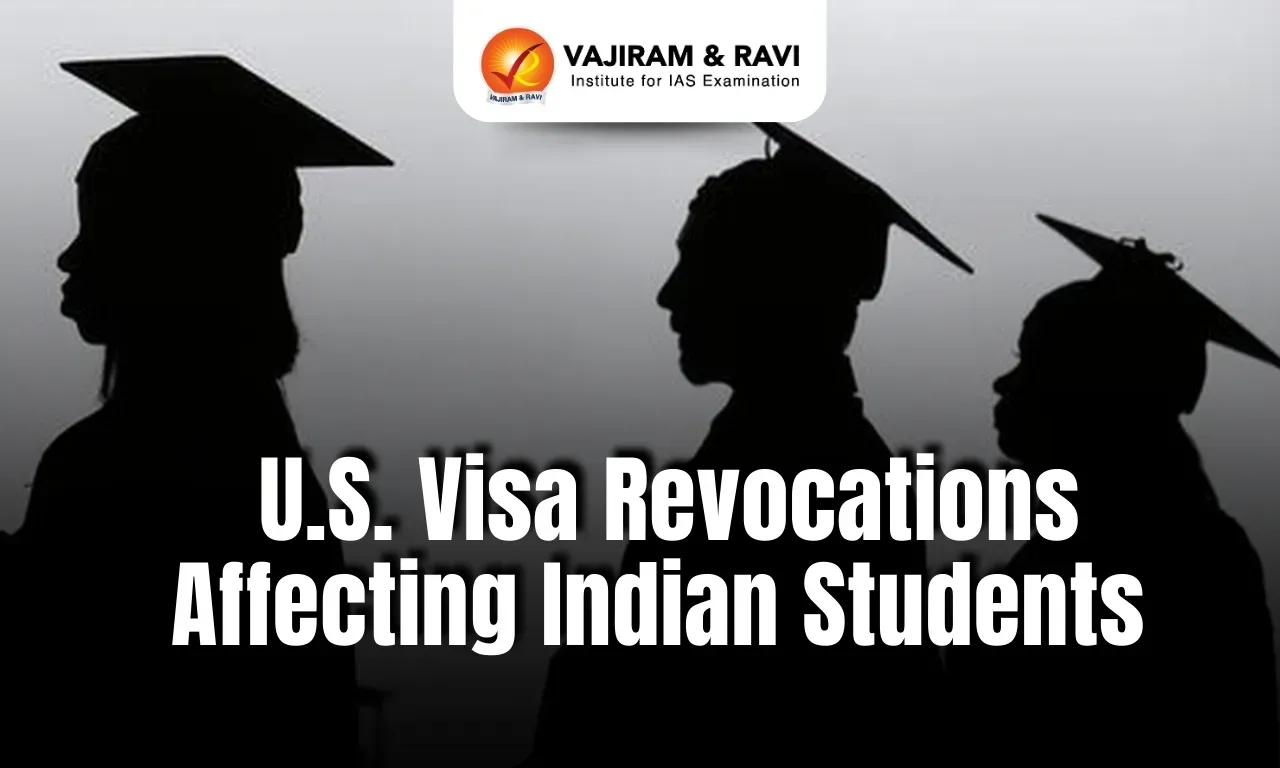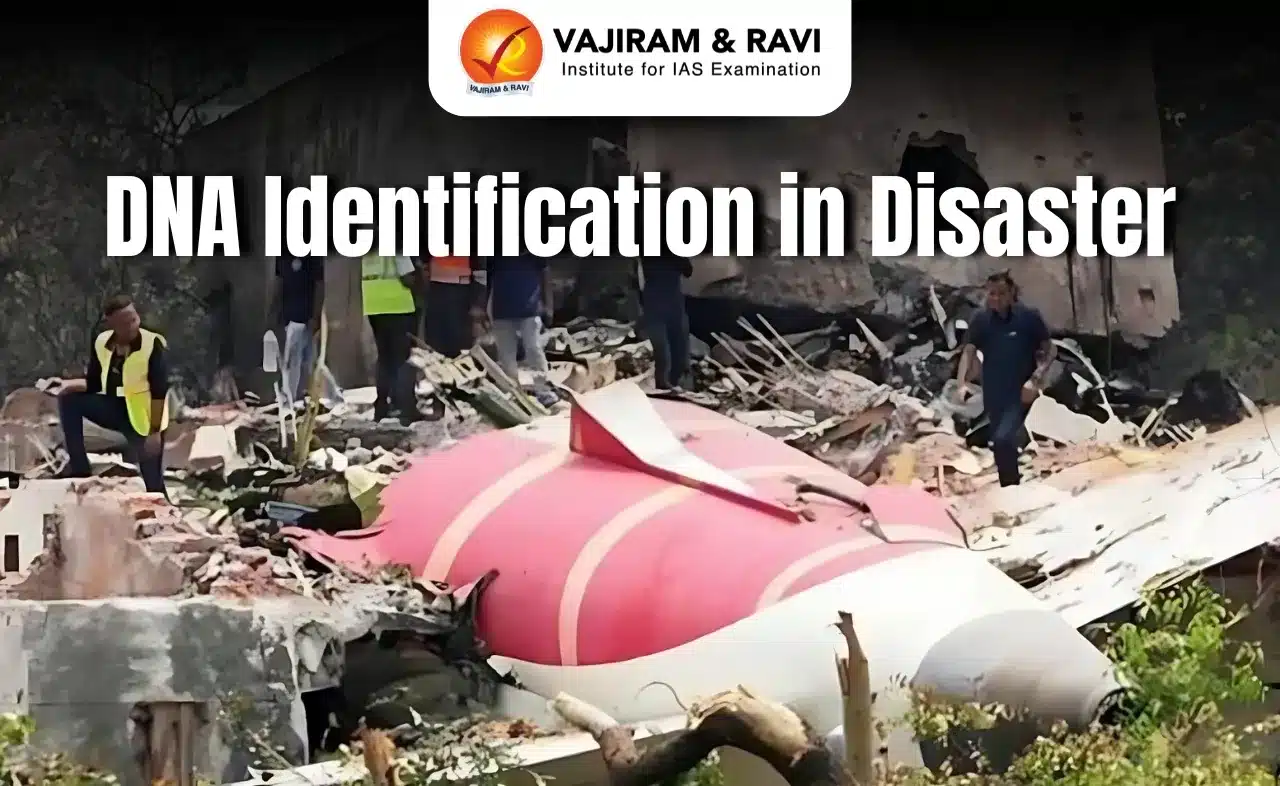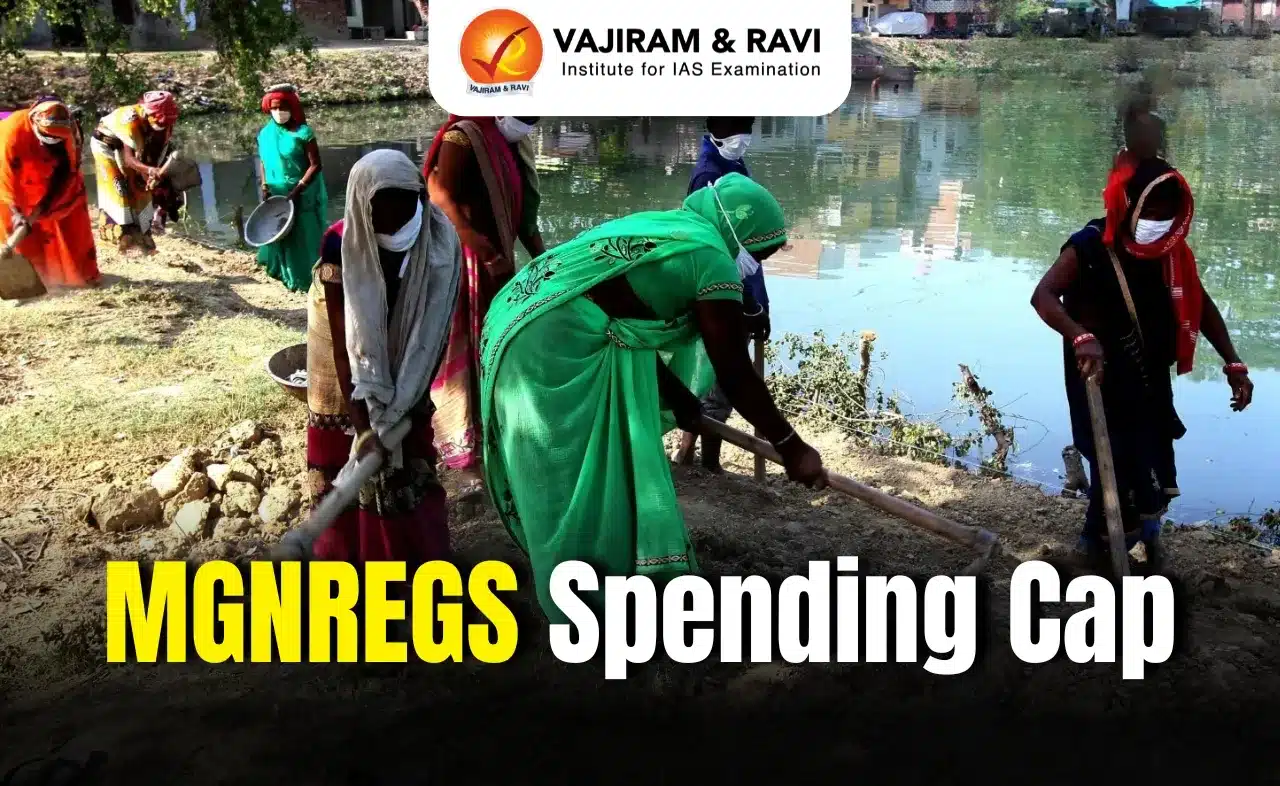What’s in Today’s Article?
- US Visa Revocations Affecting Indian Students Latest News
- Background of the Issue
- Implementation of ‘Catch and Revoke’
- Indian Students Among the First Affected
- Human Rights and Legal Concerns
- Diplomatic Outlook and Upcoming Visit
- US Visa Revocations Affecting Indian Students FAQs
US Visa Revocations Affecting Indian Students Latest News
- India has formally expressed its concerns over the revocation of visas of Indian students studying in the United States, through diplomatic channels.
- This comes just days ahead of a high-level visit by the U.S. Vice President J.D. Vance and other senior U.S. officials to India on April 21, 2025.
Background of the Issue
- Large-scale visa revocations:
- A recent survey by the American Immigration Lawyers Association (AILA) found that 50% of the visa revocation notices sent in the past two months were received by Indian students.
- Other affected nationalities include students from China (14%), South Korea, Nepal, and Bangladesh.
- Denial of targeting by U.S. authorities:
- U.S. officials denied any discriminatory targeting, stating that the “continuous vetting and visa revocation actions” apply to all nationalities equally.
- The revocations are part of a new AI-assisted initiative called “Catch and Revoke”, aimed at identifying visa holders with views perceived as inimical to U.S. foreign policy, especially through social media monitoring.
Implementation of ‘Catch and Revoke’
- AI-powered surveillance:
- Initiated by U.S. Secretary of State Marco Rubio, the program uses AI to monitor social media and assess the political views of students.
- It is linked to the Student and Exchange Visitor Information System (SEVIS), which records visa status.
- Homeland security crackdown: The Department of Homeland Security (DHS) is also terminating the status of students whose names appear in police databases, even for minor infractions or as victims of crime.
Indian Students Among the First Affected
- Two Indian students, Ranjani Srinivasan and Badar Khan Suri, were among the first to be asked to “self-deport”.
- Many other Indian students have since approached courts for the restoration of SEVIS status.
- The Ministry of External Affairs (MEA) initially cautioned Indian students to follow U.S. laws, but is now actively assisting affected students through Indian embassies and missions.
Human Rights and Legal Concerns
- Unjust revocations:
- The AILA report noted many revocations were based on minor offences such as traffic violations or campus infractions.
- In some extreme cases, even victims of domestic abuse had their visas cancelled due to their names appearing in police reports.
- Only 2 out of 327 cases involved any alleged political activity.
- Expert criticism: AILA Executive Director Ben Johnson highlighted the economic and scientific contributions of international students, warning that such actions threaten U.S. national interest.
Diplomatic Outlook and Upcoming Visit
- High-level meetings in India:
- U.S. Vice President J.D. Vance, along with Assistant Secretary of State Ricky Gill, will be in Delhi for bilateral talks.
- Prime Minister Narendra Modi is expected to host Mr. Vance.
- Though MEA Spokesperson Randhir Jaiswal confirmed that all bilateral issues will be discussed, he did not specify whether the visa issue or U.S. tariffs will be directly raised.
- Engagement beyond Delhi:
- Mr. Vance is also scheduled to visit Jaipur and Agra.
- U.S. State Department officials will participate in the India-U.S. Forum, organized by the Ananta Centre in collaboration with MEA.
US Visa Revocations Affecting Indian Students FAQs
Q1. What is the SEVIS system, and why has it been in the news recently?
Ans. The Student and Exchange Visitor Information System (SEVIS) is a U.S. government database tracking international students, and it has been in the news due to mass visa revocations, with a significant number affecting Indian students.
Q2. What is the ‘Catch and Revoke’ program launched by the U.S., and what are its implications?
Ans. The ‘Catch and Revoke’ program is an AI-assisted U.S. initiative to identify and cancel visas of students with views deemed hostile to U.S. foreign policy, raising concerns over civil liberties and racial profiling.
Q3. How has India responded to the recent visa revocations of its students in the U.S.?
Ans. India has raised concerns diplomatically, and the MEA is actively supporting affected students through embassies and missions.
Q4. Discuss the significance of the issue in the context of India-U.S. bilateral relations.
Ans. The visa revocation issue could strain India-U.S. ties, especially in areas of educational exchange, diaspora engagement, and soft power diplomacy.
Q5. What broader concerns have been highlighted by the AILA report regarding the visa revocations?
Ans. The AILA report highlights that many visa revocations were based on minor infractions or flawed police records, risking the academic future and legal rights of international students.
Source: TH
Last updated on June, 2025
→ UPSC Notification 2025 was released on 22nd January 2025.
→ UPSC Prelims Result 2025 is out now for the CSE held on 25 May 2025.
→ UPSC Prelims Question Paper 2025 and Unofficial Prelims Answer Key 2025 are available now.
→ UPSC Calendar 2026 is released on 15th May, 2025.
→ The UPSC Vacancy 2025 were released 1129, out of which 979 were for UPSC CSE and remaining 150 are for UPSC IFoS.
→ UPSC Mains 2025 will be conducted on 22nd August 2025.
→ UPSC Prelims 2026 will be conducted on 24th May, 2026 & UPSC Mains 2026 will be conducted on 21st August 2026.
→ The UPSC Selection Process is of 3 stages-Prelims, Mains and Interview.
→ UPSC Result 2024 is released with latest UPSC Marksheet 2024. Check Now!
→ UPSC Toppers List 2024 is released now. Shakti Dubey is UPSC AIR 1 2024 Topper.
→ Also check Best IAS Coaching in Delhi





















